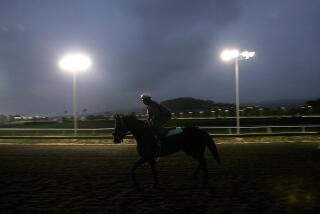He Was Quite Long in the Tooth, but He Still Left the Field Behind
- Share via
Remote places like Commodore Downs in Erie, Pa., were informally ascribed to the leaky-roof circuit of racing, and one night, in the late 1970s, the troubled track qualified on all counts. During a midsummer thunderstorm, lightning struck the roof of the clubhouse, and water dripped through, making handicapping very uncomfortable for bettors at several tables in the dining room.
Seated with his wife at one of those tables, next to a large bucket, was a local banker, one of the few in town from whom struggling Commodore had not already borrowed money. Despite the hole in the roof, he later gave the track a loan, but business stayed sour and the influx of new cash wasn’t enough to prevent Commodore from closing in 1983.
Before the end, Commodore Downs was renowned for one thing: It was an asylum for some of the oldest horses in racing to run, and some of them actually won. In fact, 20 years ago this month the aptly named Stonehenge, a 16-year-old gelding with a strong finishing kick, won a $1,500 claiming race at the not-so-classic distance of a mile and 70 yards.
Ray Hopton, one of the Commodore stewards who watched Stonehenge win on Aug. 13, 1976, immediately had an 11-year flashback. In 1965, Hopton was the racing secretary at the old Hazel Park in Detroit, where Stonehenge, a mere 5-year-old, had his best year, winning eight races.
“You see a horse like that still winning races and it makes you realize how old you are,” Hopton said.
Weeks before Stonehenge’s victory on that Friday the 13th in 1976, trainer John Fetherolf had been put on notice by Hopton and the two other Commodore stewards.
“We’ll let him run one time,” Hopton said. “But because he’s 16, if he doesn’t hit the board, we might not let him go out there again.”
Stonehenge finished fourth, which satisfied the stewards, and two starts later he was in the winner’s circle for the 29th time in his career, earning $840 for the estate of Andy Kachur, who had claimed the horse for $1,500 when he was running as a 6-year-old at Waterford Park in Chester, W.Va.
In that claiming race, Stonehenge broke down, and Kachur, disdaining a veterinarian’s advice to destroy the horse and take his loss, had a screw inserted in his damaged right foreleg. A year later, Stonehenge returned to action and won three races.
Stonehenge outlasted Kachur, who owned a farm in Ohio. Not far from Stonehenge’s stall, Kachur suffered a fatal heart attack on Memorial Day, about 2 1/2 months before his horse’s historic victory as a 16-year-old.
Grace Kachur, Andy’s widow, continued to race Stonehenge.
“He was the horse Andy liked best,” she once said. “And the horse always missed the track when we sent him to the farm. As long as horses are sound, there shouldn’t be any reason for not racing them.”
There were other old-timers in the race that Stonehenge won 20 years ago. The nine-horse field included a 12-year-old and a 10-year-old, and the average age was almost eight years.
Stonehenge, who hadn’t won a race in two years, was ridden by Pete Dalgo, the Kachurs’ son-in-law, who broke an 0-for-40 slump with the victory. Stonehenge was in sixth place after half a mile, nine lengths behind the leader, and he made up 3 1/2 lengths in the stretch, winning by a neck. He paid $23 to win.
Dalgo couldn’t make the assigned weight of 117 pounds and Stonehenge ran with two pounds of overweight.
“You have to come from behind with this horse,” Dalgo said. “There’s no way you would be able to get him to run near the front.”
As long as they aren’t being abused, horses that are long in the tooth have a place in racing. If a horse can satisfy an attending veterinarian, he can theoretically be any age and still race in California.
“Horses [sometimes] are younger at 10 than some others at 4,” said Manny Gilman, a longtime New York veterinarian. “At an older age, a horse is used to what goes into racing. They know what’s going on. Nothing rattles them.”
There is a difference of opinion about what a horse’s age equates to in human terms, but 3 1/2 years seems the most accepted common denominator. In that case, Stonehenge would have been the equivalent of a 56-year-old when he won.
Not long after Stonehenge’s victory, officials at Arlington Park outside Chicago considered bringing him together with Maxwell G., their superannuated star, for a match race, but it never came off and would have been ill-advised. Maxwell G., who ran until he was a 16-year-old, was more than a cheap claimer. When he was retired in 1977, he had won 47 times in 234 starts.
Port Conway Lane, who bounced from claiming stable to claiming stable in Maryland, won his 50th race when he was 13 in 1982. Last year, at Golden Gate Fields, the 10-year-old Greager made his 100th start a winning one, and on July 21 at Hollywood Park, the 9-year-old Rocket Gibralter, running his 100th race, won for the 23rd time.
These are old horses, and although they are competing at well beyond the average retirement age, they are still not in a league with Stonehenge.
Still, even his alleged record of winning as a 16-year-old didn’t last. On Sept. 7, 1981, also at Commodore Downs, a 17-year-old gelding named Behavin Jerry won a race.
Stonehenge didn’t quit while he was ahead. He came back to run in 1977, and was still running the next year as an 18-year-old. But he kept tripping over his beard. In those two years, he was 0 for 14, earning $388.
More to Read
Go beyond the scoreboard
Get the latest on L.A.'s teams in the daily Sports Report newsletter.
You may occasionally receive promotional content from the Los Angeles Times.










